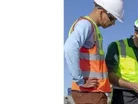Giatec's Roxi AI program cuts cement usage and CO2 emissions

Giatec has announced that its SmartRock AI program, Roxi, has been trained to reduce cement usage on construction jobsites during concrete testing and cut CO2 emissions.
The company was boosted by $2.4 million funding from Sustainable Development Technology Canada (SDTC), part of a $58.6 million investment SDTC is pumping into Canadian clean technology, and $800,000 from the National Research Council of Canada Industrial Research Assistance Program (NRC IRAP) to support the R&D of AI applications.
"Roxi is the type of cutting-edge technology that has the power to make significant environmental impacts by reducing cement usage while also being a cost-effective tool for construction jobs. We are proud to support the development of this novel AI-enabled cleantech, and to make sure Roxi gets the best training," says Leah Lawrence, President & CEO, SDTC.
Traditionally, concrete producers do not have thorough visibility into the rate at which their concrete hardens on jobsites or in specific ambient conditions. As a result, they often add more cement than needed to their mixes to ensure specified strength targets are met.
The Honourable Navdeep Bains, Minister of Innovation, Science and Industry, said: "With these investments through SDTC and IRAP, we're helping businesses lead the way in building a clean and prosperous future for all Canadians."
Giatec's suite of hardware and software products has leveraged advanced technologies such as AI and IoT including wireless concrete sensors, mobile apps, and advanced non-destructive technologies (NDT) to drive innovation throughout concrete's lifecycle.
